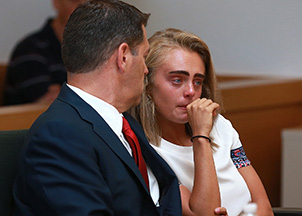By Beth David, Editor

Michelle Carter awaits her sentencing at Taunton Juvenile Court on 8/3/17. She was foiund guilty of involuntary manslaughter for encouraging 18-year-old Conrad Roy III to kill himself in July 2014. Photo by Matt West/Boston Herald/pool.
Michelle Carter, the Plainville woman who was convicted of involuntary manslaughter in the suicide death of Conrad Roy III, was sentenced to 2 1/2 years in jail, with 15 months to be served in the Bristol County House of Correction, and 5 years probation. Immediately after Judge Lawrence Moniz announced his sentence in Taunton Juvenile Court on Thursday, 8/3, defense attorney Joseph Cataldo asked for a stay of the sentence while he appeals the verdict.
Judge Moniz granted the stay for state appeals only. It means that Ms. Carter did not go to jail last week. She did, however, have to report to probation and give a DNA sample. If her appeal in Massachusetts fails, or gets appealed beyond he state, she will go to jail.
The judge cited case law in explaining his decision to stay the sentence, saying that the appeals process could easily take longer than 15 months. If Ms. Carter’s conviction is overturned, but she was already forced to spend time in jail, she could never get those months back, he said.
Ms. Carter was found guilty by Judge Moniz on June 16. She faced up to 20 years in jail.
Mr. Roy was 18 when he was found by Fairhaven police in the KMart parking lot on July 13, 2014, in his pickup truck with a spent gas-powered water pump in the back seat of the crew-cab.
Detectives found thousands of text messages between Mr. Roy and Ms. Carter, in which she encouraged him to kill himself, helped him research ways to kill himself, and berated him when he hesitated.
In a case that generated worldwide attention, Judge Moniz ruled that Ms. Carter had created the “toxic environment,” that caused Mr. Roy’s death, and, therefore, had an obligation to call police or otherwise try to remove him from the dangerous situation. Instead, she told him to get back in the truck when he got out because he was afraid when it was working.
The defense argued that she used words only and that her words were protected by the First Amendment. She was in Plainville when Mr. Roy killed himself in Fairhaven.
The prosecution argued that her constant texting and phone calls put her in Mr. Roy’s ear, making her virtually present.
On Thursday, at the sentencing hearing, Judge Moniz would only allow Mr. Roy’s immediate family members to read victim impact statements.
Prosecutor MaryClare Flynn read a statement by Lynn Roy, Conrad’s mother. In it, she said she did not go to every single hearing because it was more than she could handle and sometimes she felt “broken.”
“I still cannot come to terms that another person [who] knew and described how much they loved my son would want to inflict so much pain on myself, his dad, his sisters and all [who] loved him deeply,” Ms. Flynn read from the statement. “He is the most amazing human being and would have had a bright future. He should have been navigated into a positive looking direction.”
Conrad’s sister Camden spoke directly to the court, saying that not having that “one person I have been with every day since birth here anymore is a pain that I will always keep with me for the rest of my life.”
She said not having him there for her will always “haunt” her and she never thought that she would not be an aunt to his children or see him get married.
“He gave me the most amazing 13 years of being the best friend and best role model any little sister could ask for,” said Camden Roy. “Not a day goes by without him being my first thought waking up and last thought going to bed.”
She said she had “countless amazing memories” of him.
“It’s crazy to think that whenever I needed him he was always there, but it is even crazier that now whenever I need him he will never be there for me again,” said Camden. “I’ll never get over this pain I feel every day, but I know that he loved me more than any big brother could.”
Conrad Roy, Jr., told the court that the despair and pain he feels over the loss of his only son was the worst emotional pain imaginable multiplied an “infinite number of times.”
He said that he felt his son had come through the worst of his depression and other difficulties and was headed towards a bright future.
“As late as July 6, 2014, we were towing a fireworks barge back from Falmouth and Coco drove the tug boat through the hurricane barrier by himself with only the guide of a proud father watching over him,” said Mr. Roy.
“Michelle Carter exploited my son’s weaknesses and used him as a pawn for her own well-being,” said Mr. Roy. “She has not shown any remorse….How could Michelle Carter behave so viciously and encourage my son to end his life? Where was her humanity? In what world is this behavior okay and acceptable?”
Mr. Roy said his family has been “exploited during this court case,” and said no one should have to endure what they have endured.
“The last words I said to my son [were] ‘I love you,’ and Coco said he loved me, too,” said Mr. Roy. “I miss him every moment of every day.”
Ms. Flynn asked the judge to sentence Ms. Carter to 7–12 years in state prison. said that Ms. Carter has shown no remorse and still does not take responsibility for her role in his death.
“The facts in this case are egregious,” said Ms. Flynn, adding that Ms. Carter set on a “deliberate and well-thought-out campaign” to cause Mr. Roy’s death for her own personal gain.
Prosecutors have contended all along that Ms. Carter wanted Mr. Roy to kill himself so her friends would feel sorry for her.
Ms. Flynn said that rehabilitation is part of any sentence, but that in order to be rehabilitated, one must accept responsibility for one’s actions. Ms. Carter, said Ms. Flynn, has not. She has blamed Mr. Roy’s “frail mental state,” his family situation, her medication and has claimed a right to free speech.
“She sought attention and sympathy for herself,” said Ms. Flynn, adding that she continued to deceive until she was caught. She would have continued to play the “grieving girlfriend” if Fairhaven police had not confronted her.
Ms. Flynn also said that Ms. Carter’s “support system just does not get what she did.” They, too, in letters to the court and other statements say she “made a mistake” or “showed poor judgement.”

Attorney Joseph Cataldo speaks to reporters after the sentencing of his client, Michelle Carter, on 8/3/17. Photo by Glenn C. Silva, Fairhaven Neighborhood News.
Mr. Cataldo told the court that his client did, indeed, feel remorse and that she would have to live with it for the rest of her life. He asked for five years of supervised probation, saying she was young, could be rehabilitated, and had no criminal history.
He also said she was accepted to two colleges but could not attend because of the publicity surrounding the case. He said she is hoping to go into real estate, like her mother, and has taken online courses to get her license.
Mr. Cataldo said the situation between Ms. Carter and Mr. Roy was unique to those two individuals.
“Give her an opportunity to show this court and the community as a whole that this was a horrible circumstance that she regrets and does….take responsibility for,” said Mr. Cataldo, adding that she has “mental health issues,” of her own.
After a short recess, Judge Moniz said that the situation was a tragedy for two families. He called the victim impact statements “poignant,” but also said that everyone is entitled to a decision “devoid of any emotion.”
“I have not found that Ms. Carter’s age or level of maturity, or even her mental illness have any significant impact on her actions,” said Judge Moniz. He said she was a “bright, young lady, who did well in school.”
“And I am satisfied that she was mindful of the actions for which she now stands convicted,” he said.
Judge Moniz also ordered Ms. Carter not to have any contact with the Roy family, except when necessary for the lawsuit (see sidebar), and no contact with her friends, who testified in the case.
He also barred her from profiting in any way from the story during her probationary period, which ends in August of 2022.
“Based upon this court’s analysis, that, to some degree…that for whatever reason, part of the motivation for this activity that led to your conviction was a sense of self aggrandizement, this court now orders that you are not to profit from events you now stand convicted,” said Judge Moniz.
Click here to download the entire 8/10/17 issue: 08-10-17 PicnicOnLawn



